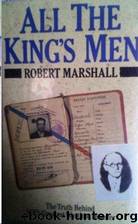All the King's Men by Robert Marshall

Author:Robert Marshall [Marshall, Robert]
Language: eng
Format: epub
Publisher: Bloomsbury Publishing
Published: 2012-03-05T16:00:00+00:00
XII
In the Wilderness
The differences that existed between MI6 and the SOE paled into insignificance in comparison with the internecine rivalry between the two German intelligence services. In Paris, it threatened to blow Boemelburg’s neat arrangement wide apart. Déricourt’s – or BOE/48’s – information had acquired a degree of status in Berlin that caused Boemelburg’s own stock to rise to an all-time high. At RSHA headquarters in Prince Albert Strasse, from Himmler down to Kopkow, the SD were basking in the Fuhrer’s unprecedented admiration. Meanwhile the SD were closing in on the anti-Hitler conspirators and Canaris’ days were numbered.
But the senior service was not about to lay down all their good work without a struggle. The animosity that existed was not merely proprietorial. They each had a very real personal distaste for the other’s methods. Canaris, the gentleman of the old school, head of the Abwehr since 1934, believed that intelligence work should be carried out according to the articles and rules of war. Not just for humane reasons, but for good solid practical reasons too. He opposed the execution of hostages because he was convinced it would throw the population into the hands of the Resistance.1 In Paris, Colonel Reile claimed, ‘The population was, if not overwhelmingly pro-German, at least disposed to do nothing if they were left alone.’2
Kopkow did not read the situation that way at all. His rise to power had been a struggle, quite literally from the beer halls and gutter brawls of the early 1930s. He was born in Ortelsburg, East Prussia, on 29 November 1910 and apprenticed as a chemist in 1928, at the Rathaus Drugstore in Allenstein. He joined the party in 1931 and the SS a year later (SS no. 45043). He first attracted the Fuhrer’s attention as ‘the sternest of guardians’ by consistently being in the front rank of numerous beer-hall battles during the early 1930s. In 1938 he was seconded to the Gestapo headquarters at Prince Albert Strasse where he set up his own office to deal with communist saboteurs.3 During 1942 he gained even greater recognition for the manner in which he conducted the interrogation of the Berlin leaders of the Soviet espionage network, the Rote Kapelle (Red Orchestra). In a celebrated coup, Kopkow agreed a deal with the leader, Schulze-Boysen, whereby in return for some much-heralded secret papers, he promised to postpone the expected death sentences on Schulze-Boysen and his colleagues – until after December 1943. (By which time, the Soviet agent was certain the war would be over.) Kopkow’s assurance that he would preserve the lives of the Soviet agents even convinced his own staff. When the promise had extracted all that he needed to know, Kopkow stunned everyone with the coldness of his comment, ‘I was not authorized to make such a promise.’ He knew the execution squads would have ignored him anyway.4
Following their success with the Rote-Kapelle, the penetration of the PROSPER network seemed to make the SD invulnerable. Boemelburg, his ‘crack criminal investigator’, had assured him they as good as had the date of the projected invasion.
Download
This site does not store any files on its server. We only index and link to content provided by other sites. Please contact the content providers to delete copyright contents if any and email us, we'll remove relevant links or contents immediately.
| Africa | Americas |
| Arctic & Antarctica | Asia |
| Australia & Oceania | Europe |
| Middle East | Russia |
| United States | World |
| Ancient Civilizations | Military |
| Historical Study & Educational Resources |
The Radium Girls by Kate Moore(12014)
100 Deadly Skills by Clint Emerson(4917)
Rise and Kill First by Ronen Bergman(4777)
The Templars by Dan Jones(4681)
The Doomsday Machine by Daniel Ellsberg(4484)
The Rape of Nanking by Iris Chang(4201)
Killing England by Bill O'Reilly(3994)
Stalin by Stephen Kotkin(3956)
Hitler in Los Angeles by Steven J. Ross(3941)
12 Strong by Doug Stanton(3541)
Hitler's Monsters by Eric Kurlander(3328)
Blood and Sand by Alex Von Tunzelmann(3193)
The Code Book by Simon Singh(3177)
Darkest Hour by Anthony McCarten(3117)
The Art of War Visualized by Jessica Hagy(3000)
Hitler's Flying Saucers: A Guide to German Flying Discs of the Second World War by Stevens Henry(2744)
Babylon's Ark by Lawrence Anthony(2671)
The Second World Wars by Victor Davis Hanson(2521)
Tobruk by Peter Fitzsimons(2504)
